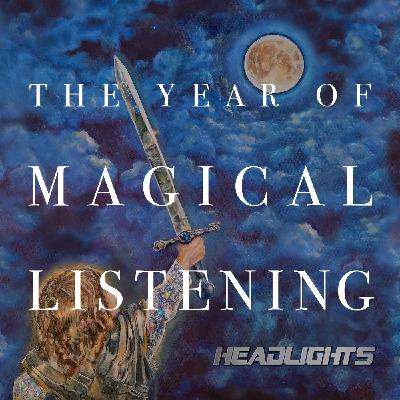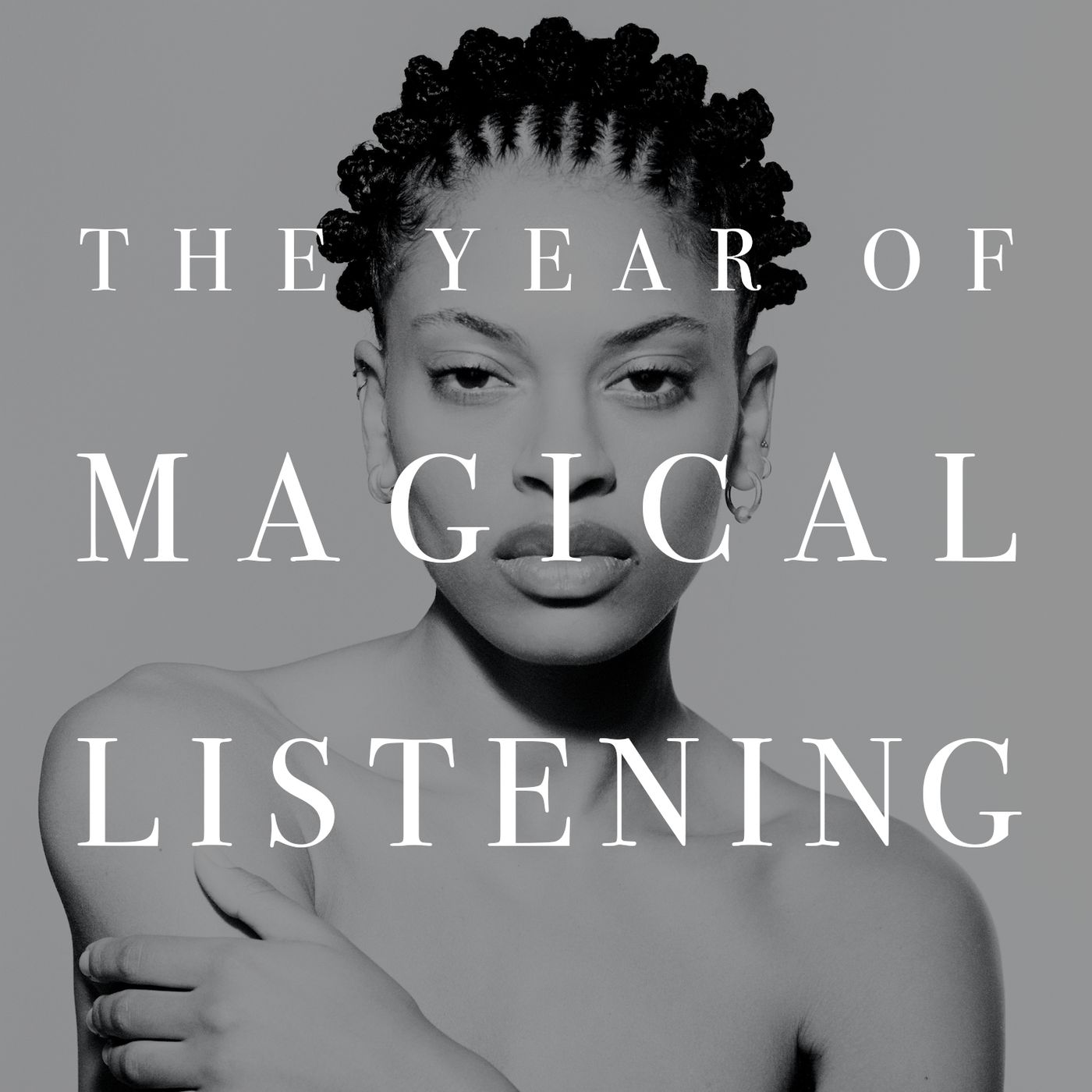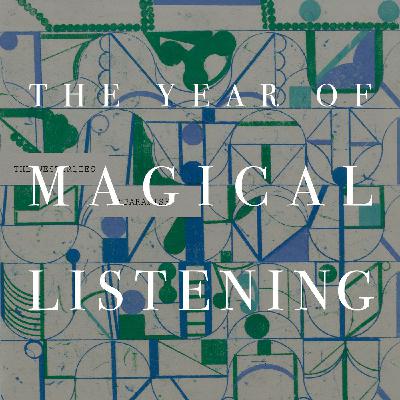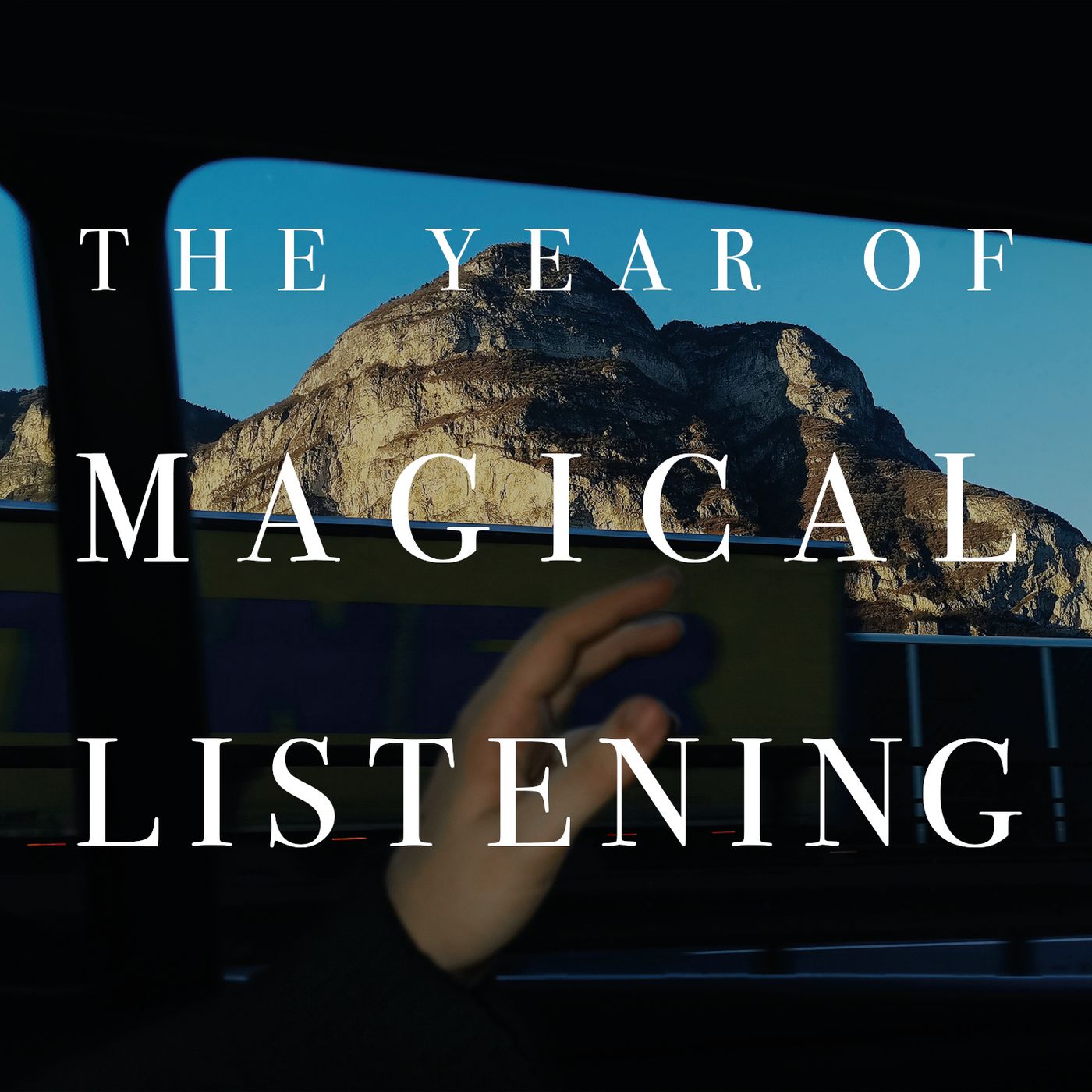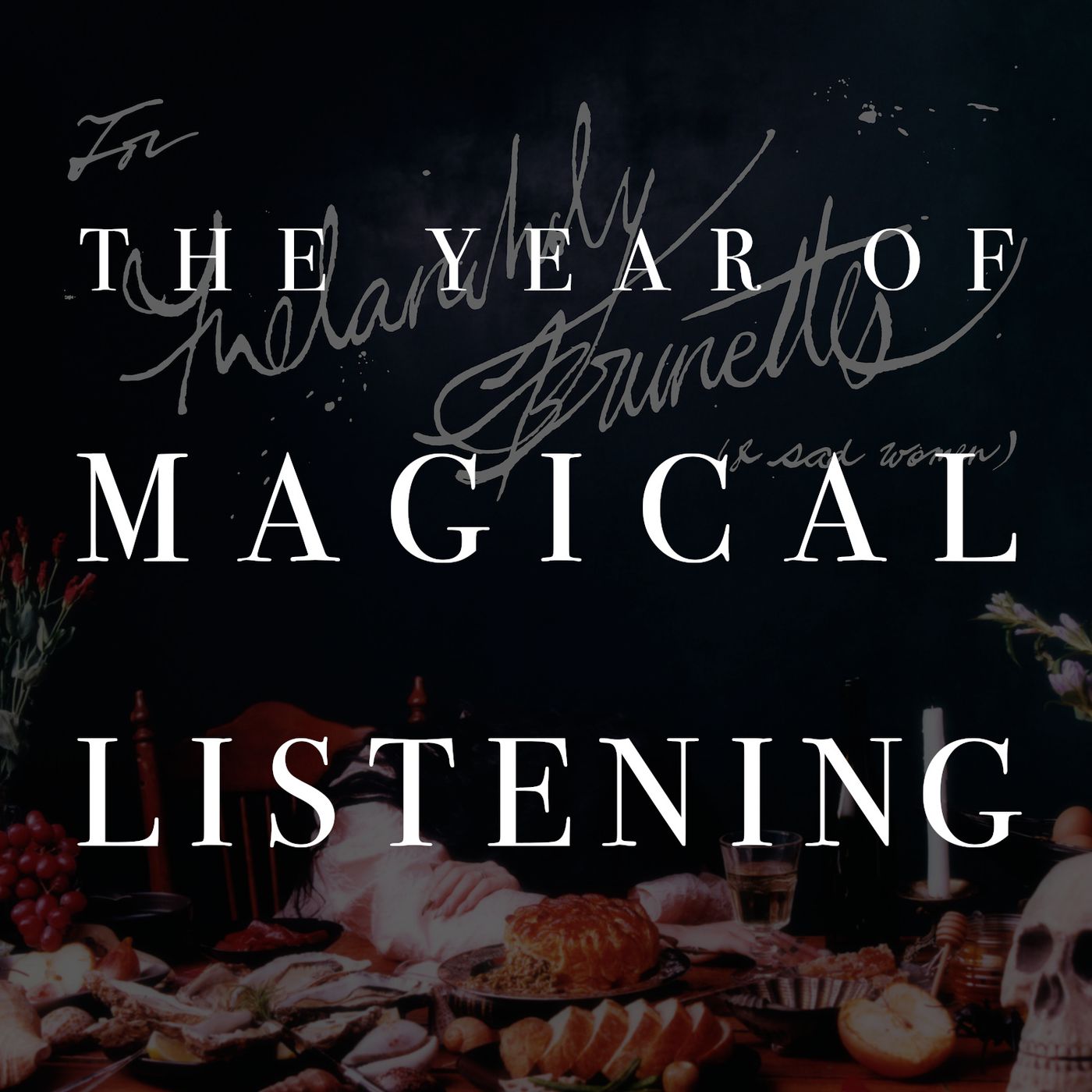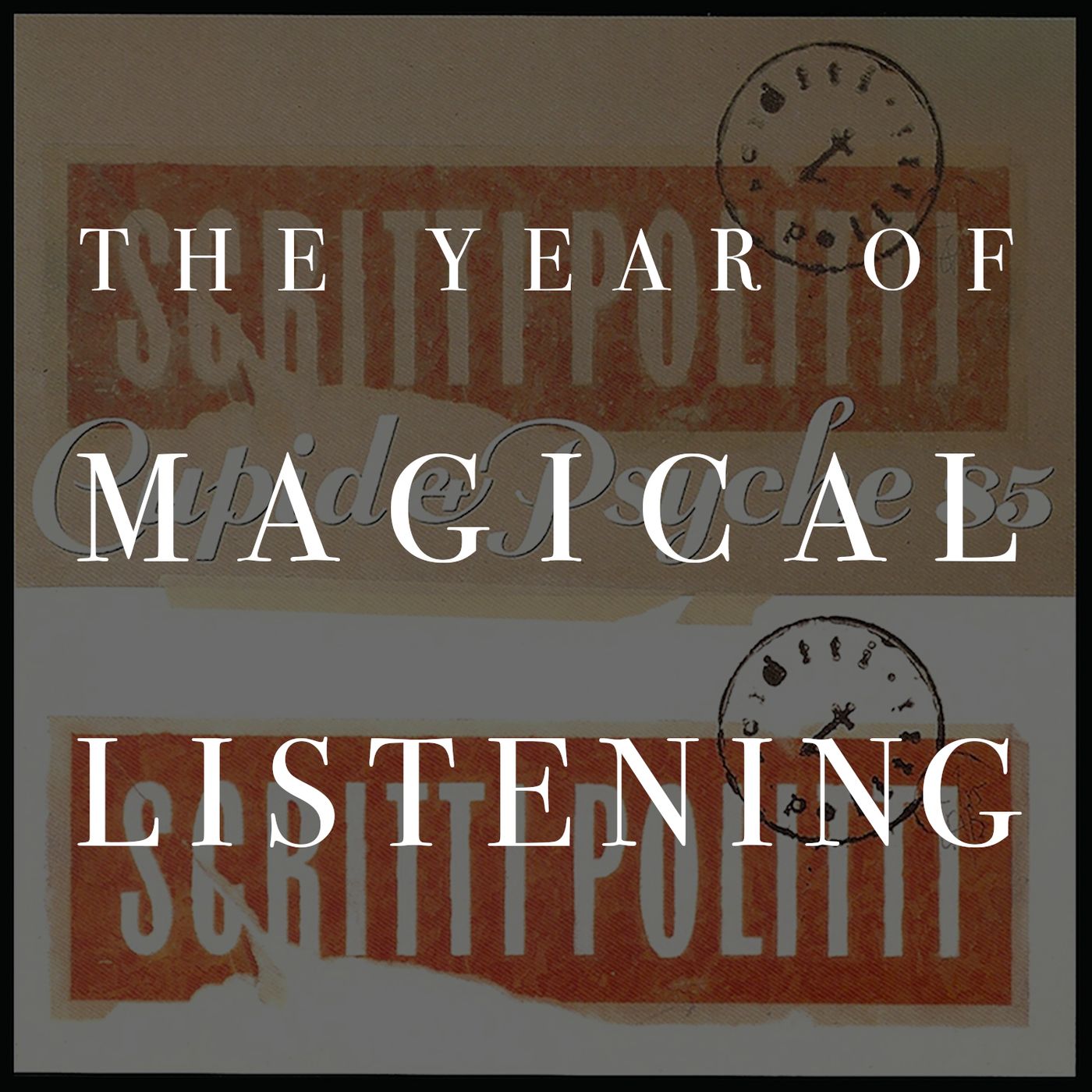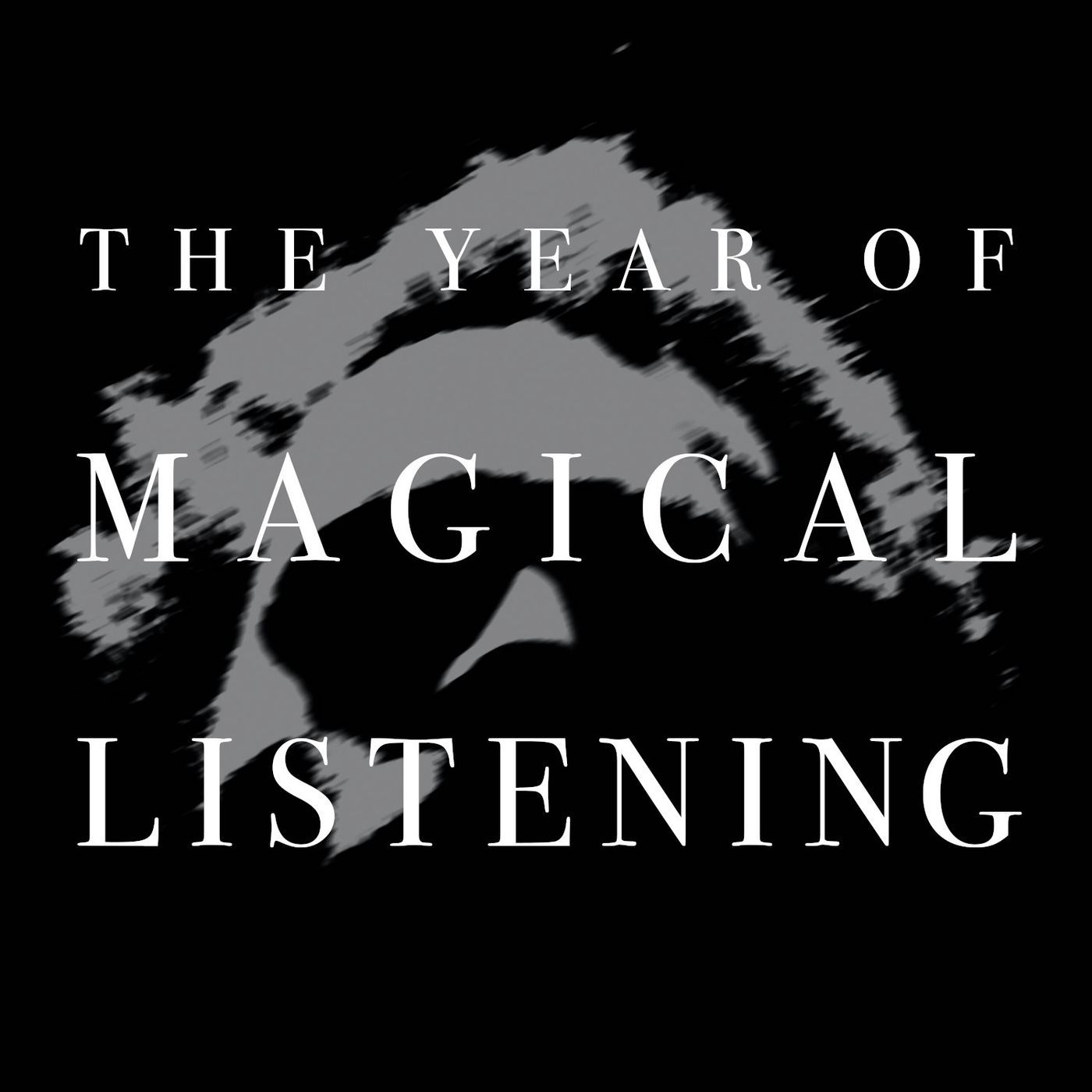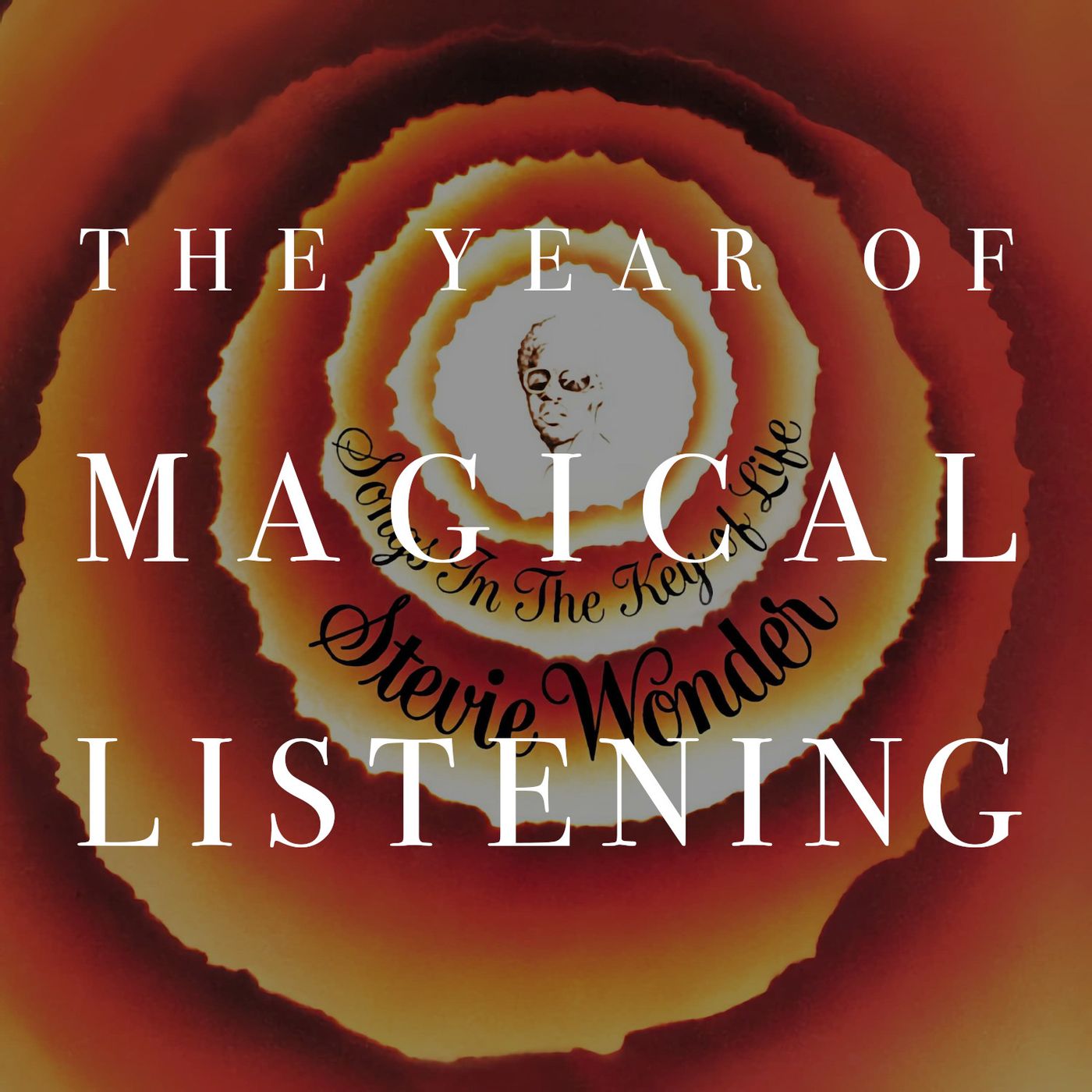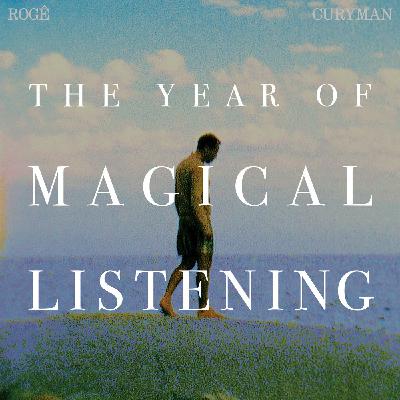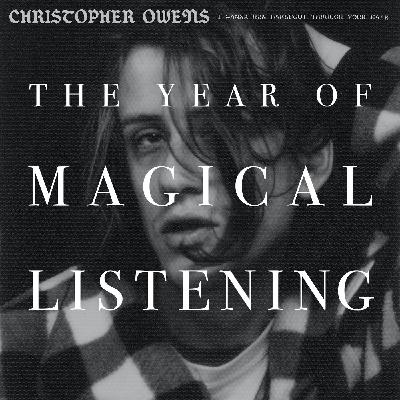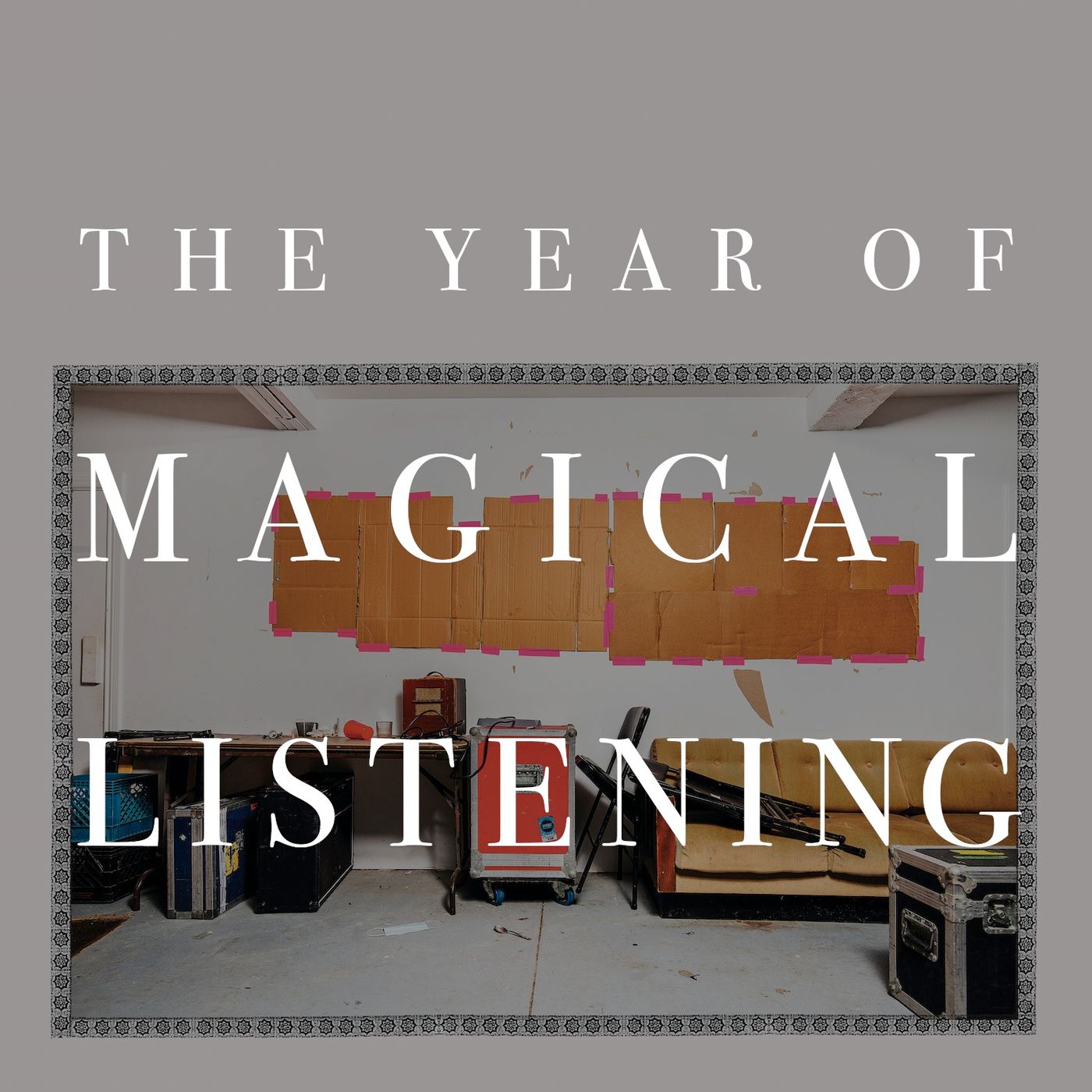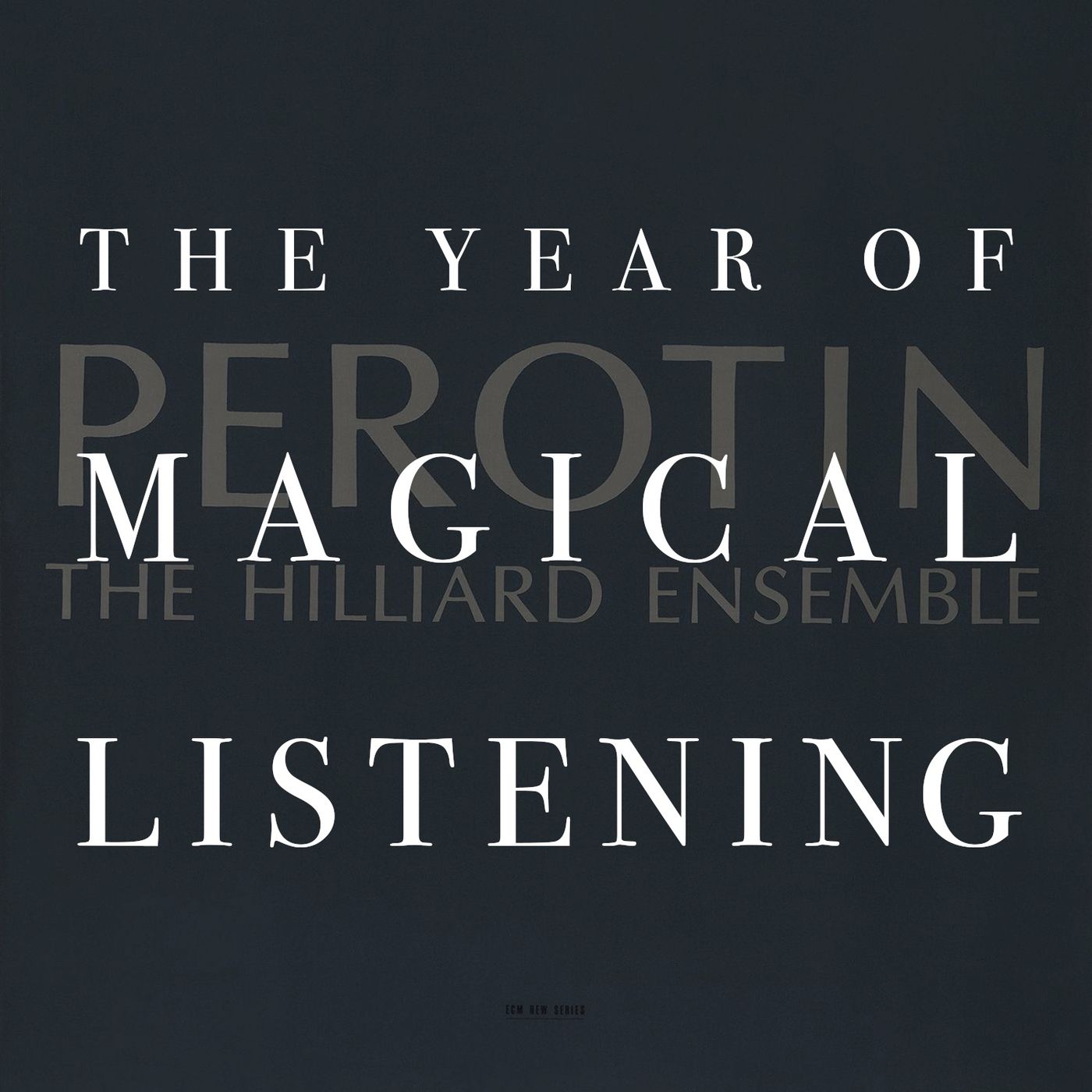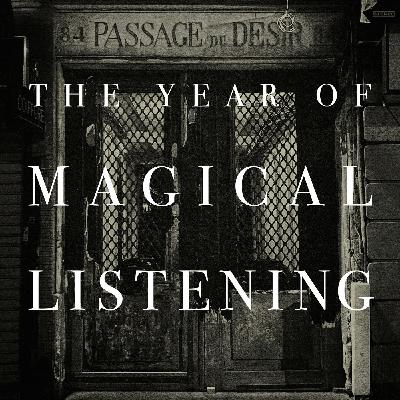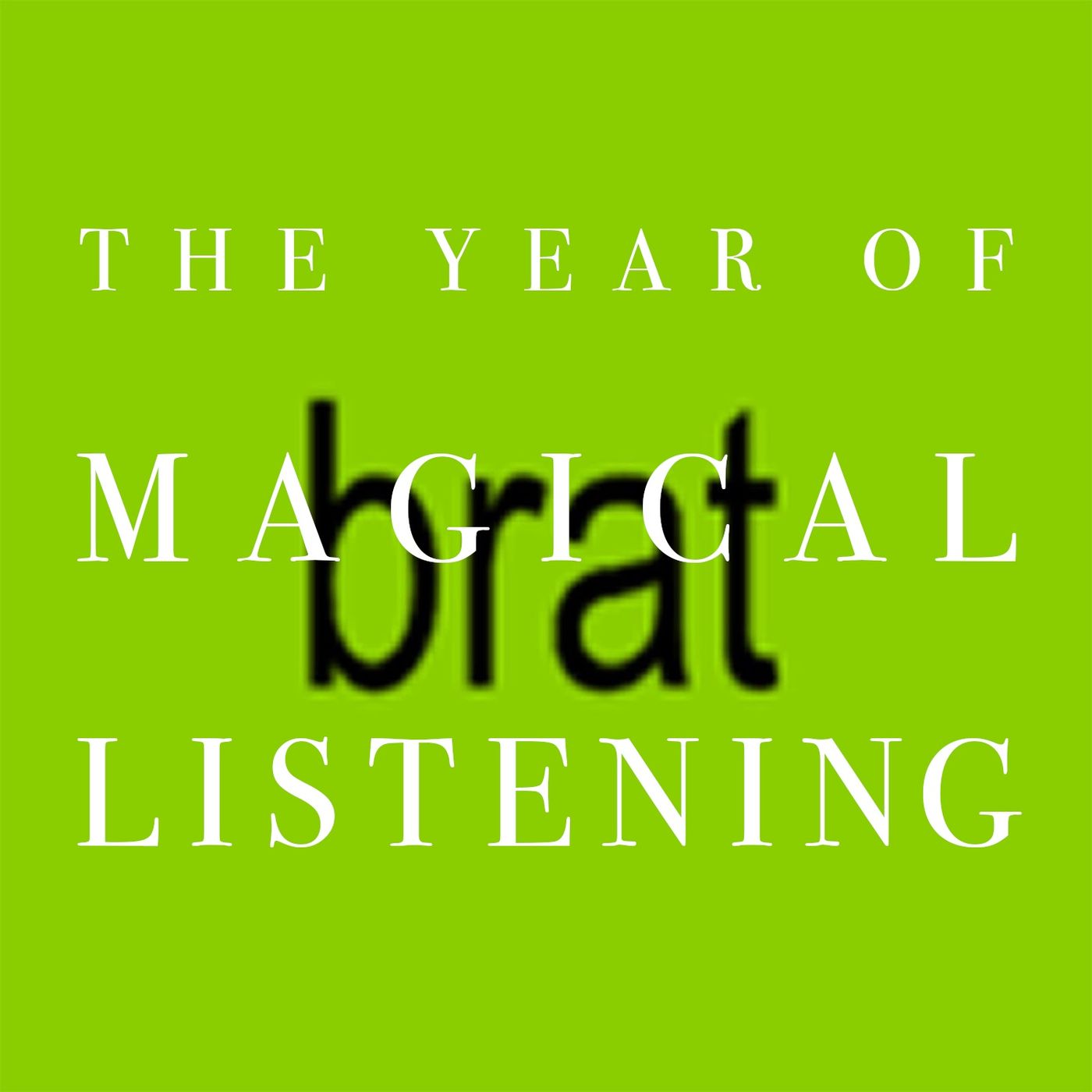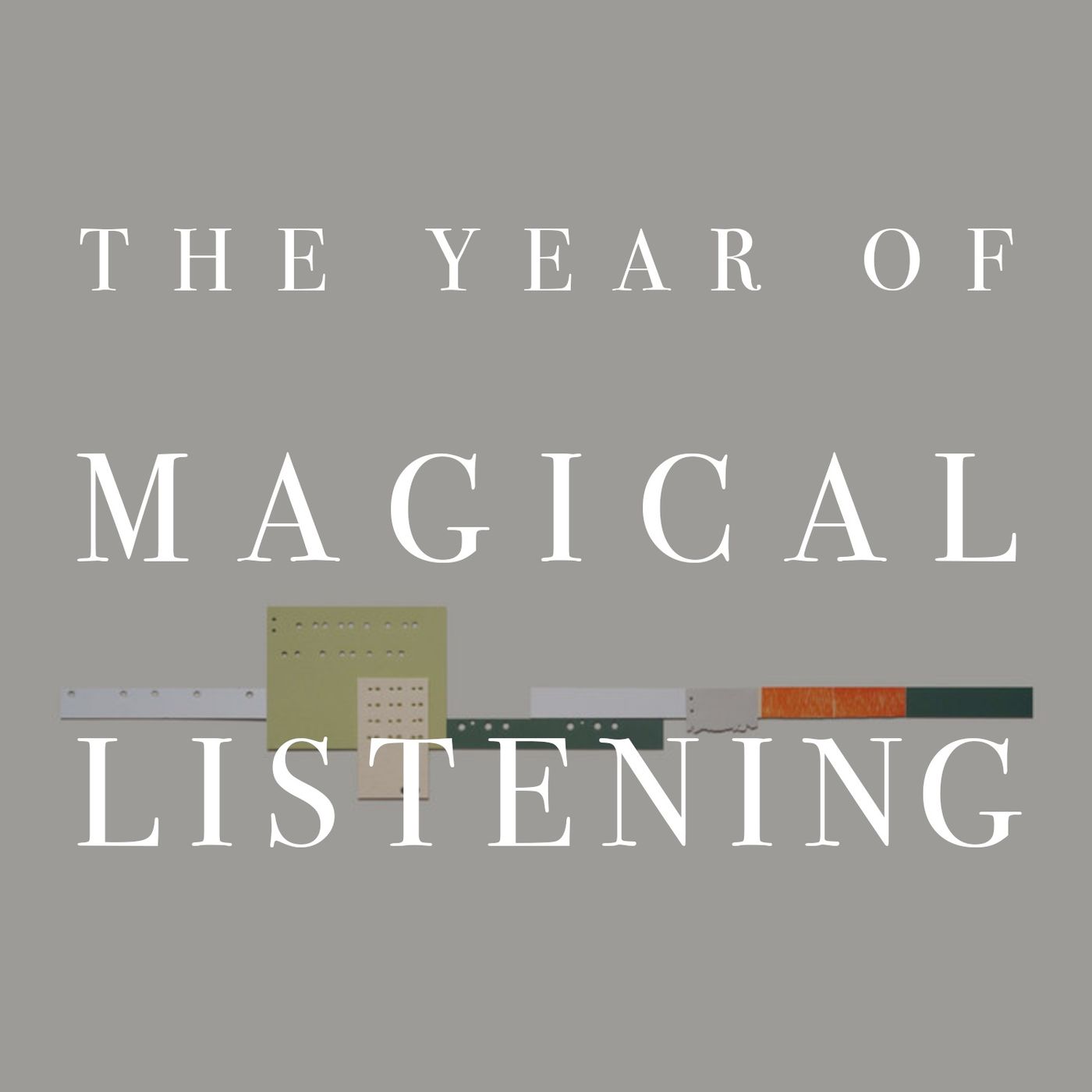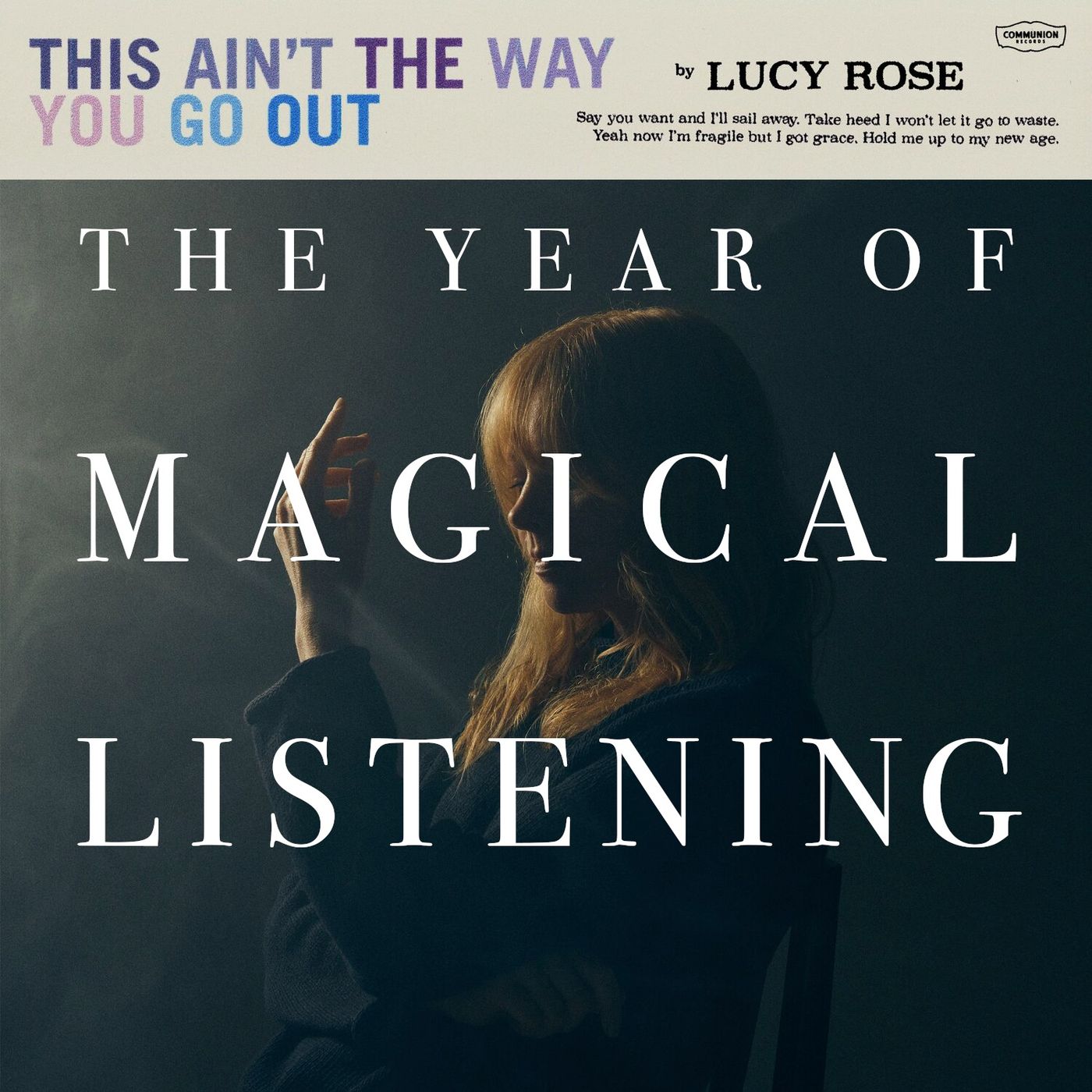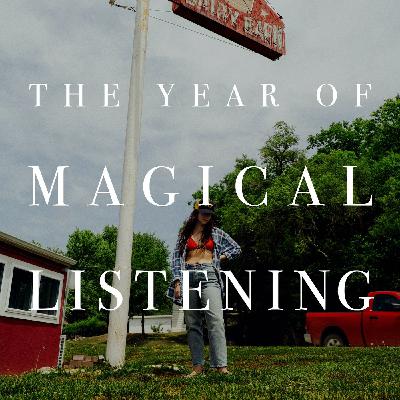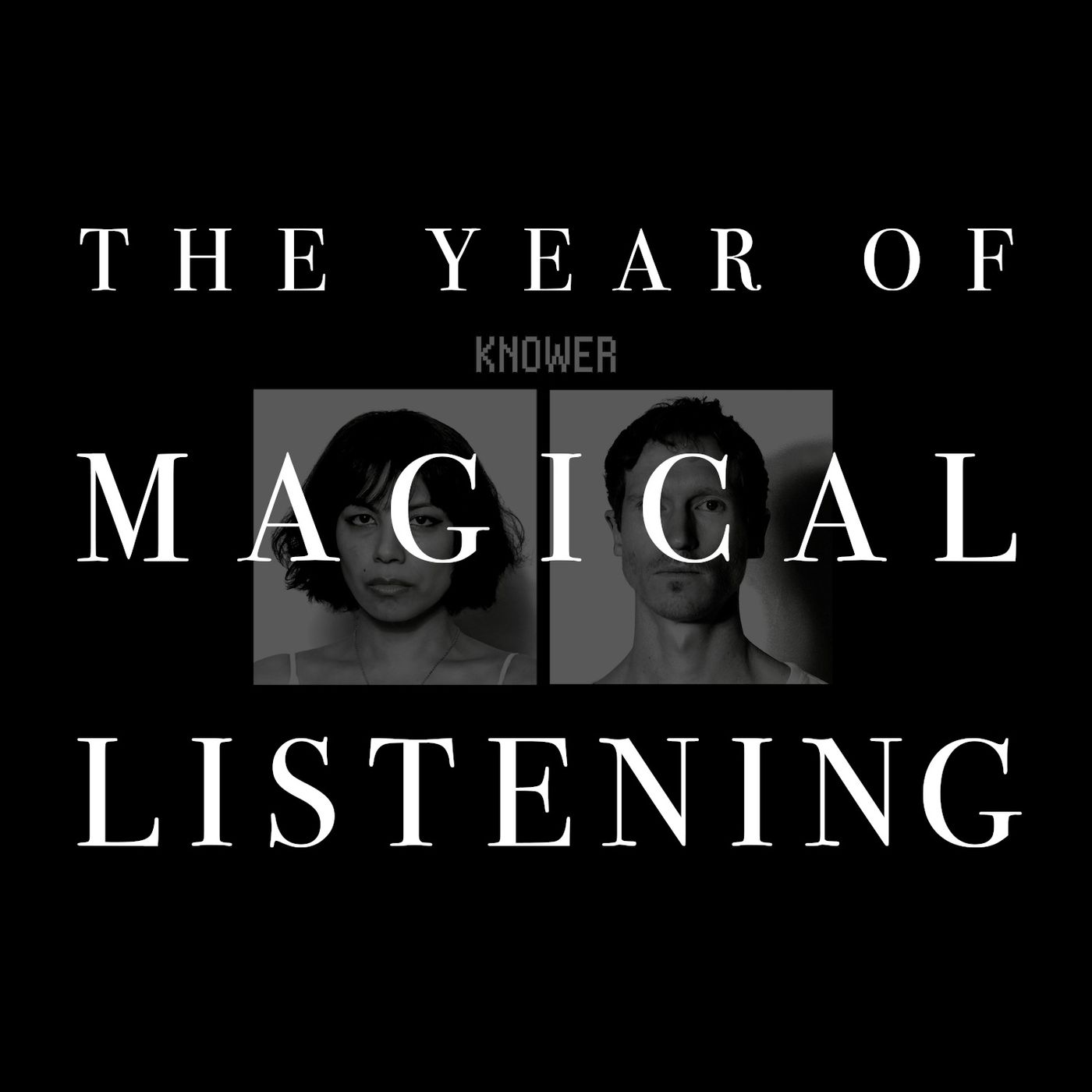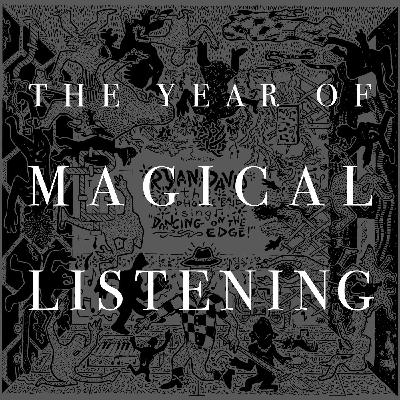Discover The Year of Magical Listening
The Year of Magical Listening

48 Episodes
Reverse
FEATURING "June Guitar" by Alex G, from Headlights, released by RCA Records in 2025. Listen / Buy direct TRANSCRIPT There are some songs I think of as just perfect. It's a silly thing to think about any piece of music, but especially about something as humble as this. Yet there's an unmistakeable quality here, a potent mix of vulnerability, pathos, and yearning – a remarkable delicacy, like a bird that's just landed in the palm of one's hand. It's sweet, but so strange: the gravelly voice, the uneven melody, a nonchalant hand drum, and this tinny vocal counterpoint. Why should this all come together so beautifully? I can't explain it; I can only say how it makes me feel – how I swell up inside, full of this song's emotion, entranced by its tune, awash in waves of melancholy yet still brimming with hope. See what I mean? It's just perfect. And here I have to admit that I actually have no idea what this song is about. Heartbreak, surely. But also the wisdom that comes with age. And perhaps, despite this, a lingering wistfulness for youth. But the more I listen, the harder it is to pin the lyrics down. They remain suggestive, evocative, and, most of all, elusive – but that's how our feelings are too sometimes, and so maybe this song is just an apt articulation of inarticulate emotion. And so it's fitting that this song doesn't end with any definitive statement. The vocals just fade out, a synth chimes in, the accordion returns, and the ensemble builds into this swirl of mixed feelings. And as I'm also at a loss for words, I'll leave you instead with an image, from this song's music video, which closes with the band joining hands and circling the singer in a game of ring-around-the-rosy. It's incongruous, but it strikes me as the perfect image for this perfect song: dizzying, loving, intimate, childlike, and free.
FEATURING Tether by Annahstasia, released by drink sum wtr in 2025. Listen / Buy direct "Villain" "Waiting" TRANSCRIPT What does it take for a piece of music to capture our attention? Can it come down to just one thing, a singular instrument, a miraculous voice? That's all I needed to hear. With a single phrase I am captivated, fascinated by this individual before my ears, unlike any other I've heard before. Such precise phrasing, such precise control, jumping between the guttural and the angelic, hovering in its delicacy before landing firmly back on its feet. And yes, this singer's voice recalls others'; and yes, there's so much else that's remarkable about this music. I don't mean to downplay that. The production is a perfect complement, the song is a perfect vehicle, but I can't help it, I just keep coming back to this voice. And I feel like there's a lesson here, that for all the music that's been made before, a voice can still surprise us, can still stand out as utterly unique – that in the vast universe of sounds, we're still discovering new stars. And so here I am, transfixed by this star's brilliance, bathing in its light, marvelling at its individuality, the exact frequency of its sound, a world unto itself, opened up before us and beckoning us to jump in. And we're not done. I couldn't just leave it there. We have to hear at least one more from this singer that I can't get enough of, and sit a little longer with this singular voice: its cooing vibrato, its breathy rasp, its mesmerizing weave of textures, its masterful delivery. It shouldn't be possible for a voice to contain such contradictions – both hard and soft, harsh and tender, assertive and muted, masculine and feminine. But that's what holds my gaze and keeps me coming back for more: the singer's ability to span the full range of vocal expression in a single performance, to encompass all of us, all we feel, all we can be. But make no mistake: This singer is no abstraction, no mere amalgam of different vocal stylings. What is so remarkable about this music is how all these diverse qualities cohere in a single individual, to form a unique personality. To be confronted so fully with the reality of another person, in all their infinite complexity – it's not often that music gifts us this experience, but I don't mind a little waiting, if that's what it takes to find music like this.
FEATURING Paradise by The Westerlies, released by Westerlies Records in 2025. Listen / Buy direct "Paradise" "Fight On" TRANSCRIPT Such a timeless thing, music – despite the fact that it exists in time, is inextricably bound to time, somehow it's able to transcend it. I could tell you that this song was released this year, was recorded not long before that, but this says so little about how the song actually sounds and feels. What I immediately hear is history and tradition, or something deeper than that, something elemental, the very essence of music itself: a communion of voices, some human and some instrumental, coming together in harmony and forming something greater than the sum of their parts – a hymn, a prayer, an ode to the paradise that awaits us, which, in its bewitching amalgam of elements, seems in a small way to make that paradise manifest before our ears. Perhaps this is to be expected, as this is explicitly spiritual music, as its lyrics make plain. But its purpose is not to proselytize. It's as if the musicians are borrowing these idioms to reveal the spiritual power inherent in music: its ability to make palpable worlds beyond our own, to make us feel the touch of a higher power brushing up against our side. And there's something else I can't help but notice: As the song proceeds, its subject shifts from "I" to "we", and the singer turns to address us, their "comrades through the wilderness", their "partners in distress", to assure us that "we have a home in glory". I hear this as a reminder that paradise is never reached by oneself, and is only ever discovered in the collective – in the same way that music is an intrinsically relational phenomenon, a special alchemy that emerges between the disparate pieces it brings together: between melody and harmony, between singer and ensemble, between music and lyrics, and between musician and listener. And on that note, let's hear more of this alchemy in action. Because I don't want that first song to give you the wrong impression about this record, which is a collection of songs by a brass quartet, occasionally accompanied by a vocalist, but for the most part just playing on their own, weaving together their different tones and timbres into a tapestry of totalizing sound. And because it's a quartet, you can still make out its four different strands, its chorus of voices, some sustained, some staccato, some high, some low, some quiet, some loud, some melodic, some harmonic, and some almost textural. And because it's a quartet, there is also something to it above and beyond its individual members, a manifest image that comes into view from each instrumentalist playing and moving in concert with one another – in a word, there is music. I'll admit: A lot of the joy of this music for me comes from its novelty. I don't spend much time listening to brass ensembles, and so I'm especially struck by the distinctive pleasures of the form: the punch of the articulation, the interstitial breaths, the thick bass of the trombones, the squeal of a trumpet, the dynamic fluidity, the sheer power of horns. It's all the expressiveness of voice, amplified by a bell, and thus transformed into a clarion call. It calls us to attention. It calls us to assemble. It calls us to listen and behold.
FEATURING caroline 2 by caroline, released by Rough Trade Records in 2025. Listen / Buy direct "Total euphoria" "When I get home" TRANSCRIPT If this is the first time you're hearing this music, I envy you. And actually, if this is your first time, maybe stop listening to me talk about this music and give yourself a chance to hear it firsthand, unadulterated. I'll still be here when you're done. And I'll still be hearkening back to the first time I heard this music, when it still felt like a jumble of unpredictable rhythms, a band of musicians just barely hanging together, a little orchestra teetering on the edge of collapse. Because the thing about this song is that, once you've heard it enough times, everything starts to feel like it's in exactly the right place. And even though I still recognize how the song is playing fast and loose with its rhythm and synchronization, it no longer has for me the palpable quality of unruly chaos. To the contrary, it now feels like a carefully choreographed dance, its every step planned out to fall precisely as it does. Of course, the truth is somewhere in the middle. What this music really consists in is moments of deliberate serendipity, of intentional spontaneity. It was never meant to be just as it is; it was just meant to be performed in such a way that it could be, in such a way that it would result in something as beautifully chaotic as this. But in being recorded, this performance becomes reified into seeming like the music's true form, the only way it ever could be performed, the exact way it was always meant to be. And the more I listen, the more like this it seems. But I can still hear, however faintly, an echo of my first encounter with this music, when it still felt utterly unknowable, unforeseeable, and unreal. And even as the music slows and softens into something more legible – a simple and steady progression of chords repeated under a plaintive melody – even still, it remains uncanny. Listen closely and you can hear a distant throbbing, the muffled reverberations of a late-night banger, like the song is being performed in the bathroom at a party, and the party is starting to push through. It's a wild thing to leave in the mix, or not "leave" but "put", because of course this is meant to be there. The song wasn't actually recorded in the bathroom at a party; it was just made to sound like it was. So the question becomes, Why? Sure, it helps to create a tableau, a setting of sorts for the singer's inner monologue as they contemplate leaving the party and returning home. But it also makes me wonder if there's an aesthetic to the experience of being in a bathroom at a party, a sonic palette with its own distinctive character that can be deployed and appreciated in other contexts, too: the sound of distance, isolation, interiority, overwhelm, the fear of missing out, and the desire to be far away. And just as it's all starting to click into place, the party disappears, replaced in the background by some crickety static, while the foreground shifts to some decidedly unmetronomic rhythms. It's like we've stepped out only to immediately lose our footing. Which is how it feels sometimes, is it not? Again, the longer I sit with this music the more it seems to be exactly as it should be, with all its sharp corners and rough edges and uncertain tempo – because all of it creates a feeling that couldn't be created in any other way. And I haven't even mentioned the lyrics yet – the lyrics, which express at best a fragment of a thought that gets jumbled and repeated across the song: "When I get home / I might just ask / What you need to". The song never tells us what is needed, or if this intention is ever played out. It holds us, rather, in that liminal space of mental inarticulation, as an idea gets tossed around one's head without even being fully spelled out. If music can be about this, then music can be about anything. Or, put another way: Anything can be made into music. Everything has an aesthetic. There is beauty in even the smallest of moments. And there is art to help us see it and make it come alive.
FEATURING For Melancholy Brunettes (& sad women) by Japanese Breakfast, released by Dead Oceans in 2025. Listen / Buy direct "Here is Someone""Mega Circuit""Picture Window"TRANSCRIPT The best music, in my opinion, simply makes us listen, captivating our attention so fully that everything else falls away. So I guess it goes without saying that that's what this music does for me, unspooling with this lush, rococo exuberance that audibly shimmers in its brilliance. Sounds upon sounds upon sounds to just get lost in. Its cup runneth over, and I just want to drink it all in. There's something new and wondrous around every corner, to hold our focus and delight our senses – even these pitchy little flutes, with their unexpected pathos. This song is like a secret garden I've wandered into and now never wish to leave. And then there are these lines, that break my heart every time: Watching you from the yard Life is sad but here is someone Someone Someone Someone Someone There are many ways to hear those lines, but to my ear they recall that experience where we are suddenly jolted out of a depressive and anxious state of mind by the apprehension of a concrete individual before our eyes, in all their particular beauty and infinite possibility. Even if only for the briefest of moments, our attention becomes fixed on something outside our selves. And sometimes that's all we need. And sometimes that's what music does for us, too. So let's keep listening. Because this music will keep holding our attention, even as it changes in its sound and its feel, and even as it turns its own attention elsewhere. If that first song was showing us a way out of life's sadness, much of the rest of the album seems devoted to cataloguing its diverse and many causes: absent fathers, unfaithful partners, or, as in this song, "incel eunuchs". It's looking the enemy square in the eye. But here, too, the music shows us a way out of this ugliness, through the sheer jauntiness of its groove. It dazzles with a cornucopia of sounds: little rattles, big drums, a pulsating synth, and a tender accompaniment on guitar. It's enough to make you forget about everything wrong with boys these days. But that raises the question: Is this song offering deliverance, or distraction? And as if on cue, the singer delivers this chilling couplet: Well I better write my baby a shuffle good Or he's gonna make me suffer the way I should In this final turn, the song presents itself as written for one of those disturbed young men, as a means of pacifying the violence within. And although this might make it seem like some gross performance, a coerced pantomime of country western swagger, what I hear is a note of radical hope: that if anything is gonna reach these boys, if anything is gonna turn their attention away from the false gods they worship, it will be music, if we can just get them to listen. And now, a different kind of struggle: a song where the narrator is the one in need of saving, and where the cause of life's sadness is the enemy within, the singer's own mind, and in particular an anxious chittering of intrusive thoughts, permeating their experience and overtaking their consciousness, like this: Are you not afraid of every waking minute That your life could pass you by? Again, it sure doesn't sound like a song about obsessive compulsion, with its soft throb of slide guitar and pedal steel. And the chorus is weirdly affirming of these mental preoccupations, with its sweet refrain of "All of my ghosts are real". There is no denial in the lyrics, only acceptance. But in the music, I hear emancipation. It's yet another juxtaposition of sadness and salvation, with music appearing as the saving grace. And really, that's what this entire album is about: the push and pull between mental distraction and refocused attention, between the forces that plunge our minds into darkness and the moments that make us come up for air and see the light. The point is not to deny anyone's reality. Life is sad, your ghosts are real. The point is to show us that there are other realities out there too – that alongside all the death and violence and infidelity, there is beauty and joy and music. There's enough out there to save us. We just need to turn our mind towards it and let it in.
FEATURINGCupid & Psyche 85 by Scritti Politti, released by Virgin Records in 1985. Listen / Buy direct"Absolute"TRANSCRIPT Imagine, for a moment, that it's 1985, and a British band of post-punk Marxists have decided to pivot into pop. What would you expect their music to sound like? Abrasive? Ironic? Overly cerebral? Perhaps that would be the most likely story. But what if I told you it sounded like this? Angelic, mellifluous, radiant, and undeniably groovy. I don't usually like to do that, to historically situate what you're hearing before you actually hear it. I like to let the music just speak for itself. But in this case, I believe the context helps, to prime us to be surprised and to notice these curious little details, like the fact that this radio-friendly bop is a love song addressed to the "Absolute". And if you're wondering if I mean, like, the Absolute in the Hegelian sense? I do, and they do, too. But let's not get too heady right away. Because the most important thing to notice about this song is how immediately infectious it is, reveling in its newly expanded palette of synthesized sounds to create a sonic concoction that never ceases to delight and surprise. And yes, it does have a certain sheen to it – but what a sheen it is. I say all this to underscore the fact that this song, for all its self-awareness, is never condescending. It's fully in it and committed; it's pop music through and through. And that's what allows it to be a little bit meta. So let's get into it. Let's talk about this love song to the Absolute. Because the way I see it, it's a distillation of what pop music is always actually about: the musical expression of desire, in all its thrills and throes. And here's the thing about desire: We like to talk about it as if it's for some particular person, but it's never that simple. The object of our desire is always some ideal, some figment of our imagination, some distant glimmer that beckons us from beyond what's in front of our eyes. We cannot actually grasp it; that's why we desire it. So isn't it just more honest to address your love song, not to pop's paradigmatic "boy" or "girl", but to the transcendental principle of a perfect and self-sufficient form of being? And if that all sounds like a little much for a pop song, the good news is that you can set all that aside and just luxuriate in the sound of this music, because this song is never overbearing with its philosophy. But make no mistake: This album is full of these bits of wisdom, these incisive one-liners that encapsulate the fundamental nature of desire better than anything else I've ever heard in a pop song, lines like: There's nothing I wouldn't do / Including doing nothing I got a lack, girl, that you'd love to be Now I know to love you / Is not to know you These are lyrics I never thought I'd hear in a pop song. But what I love about this music is that, as philosophical as it gets, it never stops sounding like this. Because it knows that this is the sound of desire, in all its ecstasy and magnetism and larger-than-life feeling. The music reifies, even as the lyrics deconstruct. It's the essence of desire made manifest. It's absolute idealism at its finest.
FEATURING LOWER by Benjamin Booker, released by Fire Next Time in 2025. Listen / Buy direct "BLACK OPPS" "NEW WORLD" TRANSCRIPT I never cease to marvel at how music in an instant can evoke a feeling or create a mood – and what's more, that it's able to do so in perpetually new ways, just through the careful selection and novel juxtaposition of sounds: a lacerating guitar tone, accentuated by a reverberating chime, layered over a beat that's all fuzz and thump, accompanied by a ghostly voice. It's this voice that really did it for me, drew me in and made me listen, to something so immediately delicate and chilling. This raspy whisper, singing ever so softly, in a way that should scarcely be audible, and yet, pervades the mix like a miasma. And even as everything else gets dialed up for the chorus, the main vocal stays as it was, still just barely breathing out the words, but now doubled by a second voice, singing higher and louder as if howling from a distance, as the rest of the ensemble creaks and buckles under the weight of its own crescendo. It's a sonic landscape that's steeped in dread, which makes it a fitting soundtrack for the song's lyrics, which allude to the tyrannical gaze of state surveillance and its clandestine acts of violence and oppression. If this music sounds hostile, that's because it's describing a hostile world. But there's a little prayer inside the mayhem: Give a little love... Have a little dream... Hallelujah, dying fighting For a life I ain't had yet It's not quite hope, but it's a note of resistance, a counterpoint to the overwhelming sense of unease that otherwise permeates the song, a reminder to hold it together even while the world around you is falling apart, fraying at the seams, and disintegrating into noise. But perhaps, through the static, something new will emerge: a sound still bruised by the world's roughness, but a little softer and brighter and, dare I say, hopeful. The voice is just as chilling as before, though it now seems to speak with greater ease and self-assurance. Its tone is matter-of-fact, even as it addresses its own oppressor and describes its own subjugation, as if it is strangely at peace. And again, as we move into the chorus, the main vocal is multiplied, swelling into a lush choir of sonorous voices, washing over us like waves on the shore. What a turn from the previous song. But I can't help but hear it as a response, countering the last song's images of racial domination with a pithy encapsulation of the master–slave dialectic: You can't be who you are without me Beneath you... Down here If this song sounds breezily confident, it's because it's flush with the knowledge that, as bad as things are, this is not how they're supposed to be. And even if the singer can't say when a new world will arrive, they at least know that they are it. And maybe we can hear the new world arriving right now, in this music, as a strange beauty begins to form out of an assemblage of musical debris – a winding phrase from a violin, a touch-tone keyboard, a metronomic piano, a pounding guitar, a boom-bap beat, and then, the sky opens up, making way for the infinite heavens, the glittering stars, the limitless future, and one last refrain.
FEATURING "As" by Stevie Wonder, from Songs in the Key of Life, released by Tamla Records in 1976. Listen TRANSCRIPT Classic songs are classic for a reason. And this song wastes no time. It just immediately launches into this immaculate verse, a silvery melody set atop prismatic chords, all to express that most quintessential of messages: "I'll be loving you always". It's an encapsulation of what every pop song strives to be, and we're not even a minute in. And before we get there, the song will already start veering off in its own direction, transforming all of a sudden into this gospel-inspired chorus, with these new and almost haunting harmonies, which turn the song into something mystifying, riveting, and rapturous. But the song won't hold us there, at least not yet. And so we return to the sweetness of the verse. But even here, we can start to notice a gnomic quality to the lyrics, with lines like "As time knew to move on since the beginning" or "As now can't reveal the mystery of tomorrow". What is this? Is it a love song, or a treatise on metaphysics? Or is it the genius of this song, to recognize that love cannot be expressed in any other way or in any other terms, because love is a greater power that lies beyond the grasp of words? Though we can start to feel a tremor of that power in this refrain, with its dark chromatic tension and full-throated call and response. And this is also where the lyrics reach their most evocative pitch, with a series of impossible similes like "until the day that eight times eight times eight is four", or "until the rainbow burns the stars out in the sky". Obviously, what the singer means is that their love is everlasting. But the song sure makes you feel like something deeper's being said. And this is where a lesser songwriter would've left things, and where commercial radio would start crossfading it out, as indeed they do, per the radio edit of this song. And this would be sufficient; these first three minutes are already a monumental achievement of pop songwriting. But on the full album version of this song, there's still four minutes left, and the songwriter is just getting started, and is about to blow the whole thing wide open. Suddenly the singer assumes a whole new voice and tone, replacing their loving proclamations with preacherly exhortations. They're now speaking directly to us, and they're about to mince no words, in my favourite lines of the song: Make sure when you say you're in it but not of it You're not helping to make this earth a place sometimes called Hell Change your words into truth and then change that truth into love This bridge is truly a bridge to the back half of this song, which feels like it occupies a whole new plane of existence. Because it's now clear that this song isn't just about some ordinary love, everlasting as it may be. It's also about a higher, more transcendent love, which is not the typical stuff of pop songs. Perhaps it's about the singer's love for God, or about God's love for humanity, but in my mind it's most centrally about the universal love we're all meant to have for one another, and that love's absolute transformative power. There's no way to truly describe this love in words. The only way to get at it is analogically, through a series of impossible similes, or by extension from a never-ending romantic love, or by means of a seven-minute sonic opus that stands as a musical exemplification of that love's endurance and supremacy. It's enough to send shivers down your spine. But what amazes me most about this song is that, up until this year, I had never truly heard it. I may have caught flashes of it in the background, heard it playing here and there, but I had never sat down and let it speak to me. I should've known better; classic songs are classic for a reason, after all. But maybe there's a lesson in that, for the power of love is also easily missed, even though it is always there, at the ready, just waiting for us to take it up, as it always will be, until the day that you are me and I am you.
FEATURING Curyman by Rogê, released by Diamond West Records in 2023. Listen / Buy direct "Pra Vida" TRANSCRIPT It's a new year, and this isn't a New Year's song, but that doesn't stop it from feeling like one, from feeling like the song I need to have with me to face the year ahead: this energy, this vitality, this exuberance. Just listen to this rhythm section: the classical guitar strumming in punchy syncopation; the bass keeping a steady downbeat; a ganzá rattle subdividing the rest; and this pitched percussion instrument off on the right – an agogo perhaps? – tapping out a spirited samba beat. Could it be any more full of life? It's like the music itself is dancing and laughing and beckoning us to join in. And so it's fitting that the song's Portuguese refrain instructs us to "let it go, let it be, let's live". A simple imperative, but what else needs to be said? And look: This isn't my first samba. I've heard grooves like this before. I've heard performances that are similarly vibrant and vivacious. I'm not saying that this song is like no other samba that's come before it. But there's a distinct joy in hearing it done this well, in hearing an ensemble come together like this, and in feeling that indomitable samba spirit come alive. So let this song serve as a model, and let this be my new year's wish. May your spirits be this uplifted. May your voice be full of song. May your body be always dancing and your heart be never still. May your mind be free from worry and your soul just be free. May you let it go, let it be, and live.
FEATURING "Beautiful Horses" by Christopher Owens, from I Wanna Run Barefoot Through Your Hair, released by True Panther Records in 2024. Listen / Buy direct TRANSCRIPT Let's end the year with a little tenderness. Because what better time is there to open up and show how you feel, to bare your heart and say all the things that so frequently go unsaid. ♪ Please don't nag at me ♪ Okay, perhaps not the sweetest opening line. ♫ I will be strong for you ♫ Now that's a little better. ♪ Don't say you're worried ♪ That's reassuring, even. ♫ Don't say you're scared ♫ And now we're getting somewhere. So let's put it all on the table. Because in the end, it's all about love. And "love is enough." It's easy to feel like this song is stumbling over its words just to express a simple message, but sometimes the simple message is all there is to say. And with a message like this, the words are kind of beside the point. For the real expressive instrument here is the vocal delivery, the naked vulnerability in the singer's voice, which says so much without having to say anything at all. And then, in the song's midsection, the expressive power of that voice gets transposed to the guitar. And maybe it's just because I hear so little guitar-driven music these days, but man, does this solo ever hit. As it weaves its way through licks and arpeggios and distorted harmonics, it's like its tracing the contours of the singer's feelings, in the clearest expression yet of what they really want to say. And then, a digression about Christopher Reeve. Because this song isn't some perfectly constructed poem. It's impulsive and weird and sometimes vulgar and a little bit all over the place. But you know what? It's authentic and heartfelt and saying exactly what it thinks. Or maybe it is a perfectly constructed poem, as it closes with this bewitching simile between the singer's hands and beautiful horses, galloping into the distance. I'll be honest: I don't understand this song, why it works, its unusual magic. But I know how it makes me feel, and maybe that's its true secret: to be able to convey through words a feeling that's beyond them, and to not let language get in the way of saying what you mean.
FEATURING "NO TITLE AS OF 13 FEBRUARY 2024 28,340 DEAD" by Godspeed You! Black Emperor, released by Constellation in 2024. Listen / Buy direct "RAINDROPS CAST IN LEAD" TRANSCRIPT Must music have a meaning? Does it have any other choice? Obviously, music need not be representational; its sounds need not be taken to depict anything, concrete or abstract. But what, then, to make of the fact that music can so readily bring us into a certain feeling or state of mind or situation? Surely, such music must be said to be conveying something – something ineffable perhaps, but not void of sense. Even this music, what's playing right now, seems rich in significance, despite its minimal elements. I hear in it an unsteady serenity, a momentary peace, an eerie quiet, the calm before the storm, electricity in the air, bristling, quivering, full of foreboding. And then, the sky begins to rain down. The opening salvo is a simple motif on guitar, made jagged through layers of distortion and delay. But it is quickly joined by a cascade of supporting artillery: an unrelenting beat pounded out by the bass and the drums, a second guitar doubling the motif in a higher register, a counterpoint from a violin (or is it spiraling out of control?), the beat now hammered out by cymbals, propelling it on even further, and a third guitar, slicing through the burning sky. At last, the full cannonade arrives, and it's immediately disorienting, as the downbeat shifts below our feet, the two becomes the one and the one becomes the four: one last cataclysm in a whirlwind of chaos. Can there be any doubt as to what this music is trying to convey? It's hard to hear it as anything but a violent attack, a relentless assault, an inescapable blitz. Sounds howl through the air like missiles, made all the more terrifying by their patent coordination. The song's title describes it bluntly: "raindrops cast in lead". But there's another sound that can be heard, nestled deep within the maelstrom, an uncanny brightness amidst the unending destruction. I hesitate to try to say what it is. Some awful beauty? Some glimmer of hope? And then, a reprieve; and then, a disorientation of a different kind; and then, a voice – something rarely heard in this band's almost exclusively instrumental oeuvre. And it's not the voice of one of the band's members; it's not even in their, or my, mother tongue. So let me translate: Raindrops cast in lead Our side illuminated And then extinguished and buried and finished Under the perfect sun Under the body falling from the sky They were martyrs who fell Because on our side they are martyrs since before we were even born Those who tried and were killed for trying Those who died young, angry or old, and never saw the dawn Innocents and children and the tiny bodies who laughed and then fell asleep forever And never saw the beauty of the dawn "The beauty of the dawn" – is that what we were hearing earlier, barely audible beneath the barrage? Is that what we were hearing just before this, breaking through for a moment of interstitial tranquility? Is that what is now again being occluded, as the devastation starts anew? As we move into the song's second figure, a simple back and forth between two chords, between suspension and resolution, between tension and release, between uncertain possibility and brutal fact. And we're just getting started. This onslaught will continue for another three minutes – screeching, sundering, spinning out, filling the sky till there's nothing else, nothing but its program of annihilation. And there will always be more. Just when you think it's reached the height of its aggression, it gets even louder, even heavier, even noisier, even more wild and fierce. You may, at this juncture, very well be wondering, What's the point of all this? Sure, it's impressive, and unnerving, how this music can bring such a horrific scene to life. But it is, in the end, a representation, not to be confused with the reality, which is, of course, unspeakably worse. But representations can also show us aspects of reality that reality itself obscures. And so I come back to that note of awful beauty, the silver lining in the thundercloud, an indomitable spirit that can be heard beneath everything, despite everything, amidst the blistering violence an invincible glimmer of radical hope. But this music is not meant to be triumphant. It will present us with the possibility of resilience, but not its realization. Instead, it leaves us here, in haunting suspension, for there are many who will never see the beauty of the dawn.
FEATURING "Viderunt Omnes" by Pérotin, performed by The Hilliard Ensemble, recorded and released by ECM in 1989. Listen TRANSCRIPT In the beginning was the word – a mere syllable – a solitary tone. And then, there were several. And just like that, there was music: harmony, rhythm, dynamics – but more than that, a strange, otherworldly beauty that seems to appear out of thin air, suddenly floating above us and gracing us with its presence. What we are hearing is arguably the genesis of music as we know it, one of the earliest known pieces of polyphonic music in the Western musical tradition. It may in many ways appear rudimentary, its harmony of the simplest kind: a sustained drone in one voice while other voices bob and weave around it, producing a series of resonant intervals circling round their tonal center, and creating an utterly hypnotic harmonic soundscape. Simple, perhaps, but what majesty there is even in this. This music is captivating precisely because it doesn't seem like it should be possible, to pull such beauty out of thin air. How wondrous, that the mere arrangement of sound waves is sufficient to create something like this, so awesome and astonishing, as if it were always there, just waiting for us to tune into its frequency. It's like a tear in the fabric of the universe has been discovered, offering a glimpse into another world. Of course, this is all apropos to this music's raison d'être, seeing as it is literally sacred music – music of worship, music of the church, music designed to exalt an otherworldly being. But what I hear in this music does not seem tethered or limited to any particular religious tradition or faith. What I hear is music that is putting us in touch with the divine in the most universal sense – a divinity that is revealed to us through sound. And the most remarkable thing is that this divine revelation emerges from the most mundane elements. In other contexts, it may arise out of strings of catgut or rawhide skins; here, it comes about simply from the human voice. And to be sure, these are exceptionally beautiful voices, a paradigm of purity and discipline, moving in perfect coordination, and reverberating in an exquisitely sonorous space. But still, there is nothing supernatural in the mix; everything we hear is the product of human vocal cords and human vocal cords alone. The same instruments we use to talk and yell and argue and curse can also produce this. And that feels like magic. That feels like something that shouldn't be. How incredible that all of this would be present in music this primeval. But take that as a lesson, that music's revelatory powers have been there from the very start – that for as long as there's been music, it's had the capacity to fill us with wonder in this way. And the history of music is not some long march towards the perfection of this capacity, but rather an eclectic chorus of voices, all realizing this capacity to the fullest, but in new and singular ways. Which is to say, the history of music is like a series of worlds revealed to us, a sequence of curtains drawn back, none inherently better or truer than any other one, and all equally sublime. This piece of music may be one of the oldest extant examples of the art form, but its sound is timeless. Timeless, and also strange: the haunting swirls of voices, the glacial harmonic movements, the uncanny synchronicity. But this strangeness is precisely what makes the music so captivating, as if by holding it in our gaze we will spot how it works its conjuring trick. But of course the music resists our efforts and remains inscrutable. We can't ever truly explain it; all we can do is take it in. But that's why we listen. That's why we can't look away. And if this piece teaches us anything, it's that music has always been this way, and always will.
FEATURING Passage Du Desir by Johnny Blue Skies / Sturgill Simpson, released by High Top Mountain Records in 2024. Listen / Buy direct "Swamp of Sadness""Who I Am"TRANSCRIPT I know it may not sound like it right now, but I'm here today to talk about country music and a masterful singer who knows just how to play it and how to play with what we expect it to be. Now that sounds a little more like it, though there is a surprising amount of French in the lyrics. But I'll come back to what's surprising; for now I want to focus on how the music sounds and how it's doing everything just right. What I love about this music is the soft-spoken emotion that runs through every beat and measure. You can hear it in the singing, in the way each word is delicately phrased and the whole song is practically whispered. You can hear it in the instrumentation, with its bending guitars and warbling organ, weepy pedal steel and fluttering mandolin. Even that weird accordion from the beginning doesn't sound so out of place, in this context. Which is just to say that this music, like so much country music, is music of the heart, giving voice to its quiet aches and pains. If it doesn't reach the histrionic heights of other styles of music, that's because it's expressing an ordinary kind of heartbreak, the kind to which we can all, sadly, relate. And that's why the vocal delivery here is so essential. When done right, we can hear in it the singer's honesty, sincerity, and conviction. They're not trying to impress us, they're trying to tell it like it is. But then here's the irony: For all its straight talk and musical swagger, this is a song about the singer's own confusion, isolation, and instability. It's a song about the distorting effects of temptation and the "sirens" that keep luring the singer out to sea. It's a song that sees the singer likening themself to Odysseus, that wily man of many turns, the sort of shapeshifting persona that would seem antithetical to country music. But that's the beauty of this song. The singer takes this plain-spoken style and uses it to tell a different, deeper kind of truth, which might run counter to what we expect to hear from a song like this, but is in fact an even more honest statement of what it's really like to exist in this world. So what do you think the singer is gonna have to say in a song called "Who I Am"? Well, the first thing the singer tells us is that they've "lost everything I am, even my name". In an even more stripped down and straight-ahead style than before, they remind us of the wisdom that "nothing ever stays the same". Or, putting it more starkly, "they don't tell you until you die it's all a sham". And the singer shares their relief that God doesn't ask your name when you arrive at those pearly gates, since, as they say, "I couldn't tell Her if I had to who I am". That's this singer's self-introduction. That's what they have to say about who they are. It may seem like a rebuttal of the question, a rejection of its very premise. But a better way to look at it is as the only answer they know how to give. Because what this song really is is a song about aging, and how, as one gets older, it only becomes harder to know oneself, in part because of the traumas and tragedies we all suffer, and in part because of our own avoidance. It's about reaching that age where therapy can't reach us. It's about being left behind. And here's the best line, am I right? "Life ain't fair and God is cruel, but at least She ain't the man." What I hear in this song is a message, that even in the face of the existential meaninglessness of it all, it still feels good to be your own person, even if you don't know who that person is anymore – and that maybe the true wisdom of age is that you don't need to know, and that maybe life is better if you don't.
FEATURING brat by Charli XCX, released by Atlantic Records in 2024. Listen / Buy direct "360""365" TRANSCRIPT It had to happen. I had to talk about this album. It is brat summer, after all. And you know what's so great about this song? It's not giving voice to some universal feeling, like the thrill of romance or the exuberance of youth. It's not even trying to be relatable. It's just a song about the singer's own preeminence and ubiquity. It's a song about how the singer is "everywhere". If this song makes us feel anything, it's the vicarious satisfaction of a self-fulfilling prophecy or a self-evident proof. And you know what else is so great about this song? It's a total bop, even though it has no right to be. Like, what is this beat? There are hand claps and a bass line that's both rhythmically and harmonically jolting – and that's about it. But by some kind of magic, it works, and worms its way into your head, forever on repeat, drowning out all other musical memories until it becomes the only song you ever hear, the only song you've ever heard, the only song you'll ever need – until we're all just "bumpin' that", as indeed we are. But this song isn't done with us just yet. Really, it's just getting started. It's time for the remix. That same jerky beat is back once again, but pitched up and sped up, and somehow that makes it a good beat for the singer to now rap over. It all makes even less sense than it did before, and that's kind of the point. This is music that revels in its own irreverence, music that's high on its own supply, music that is unafraid of doing something dumb, on the off chance that it may end up being something brilliant. Like, what if it went all techno on us? To which the only reasonable response is: What if went even more techno? Another way to say all this is that the artist is treating their own music like a meme, something to be repeatedly twisted and warped and transformed into increasingly unexpected and ridiculous shapes. And we are being treated to the artist's infinite scroll, an endlessly unfurling mess of musical ideas, a nonstop party that we can only hope will never end.
FEATURING I Am Toward You by How To Dress Well, released by Sargent House in 2024. Listen / Buy direct "New Confusion""Crypt Sustain"TRANSCRIPT From its very first notes, it's like a beatific vision. Almost laughably so, with its arpeggiated harp, ethereal synths, and lush reverb. It welcomes us warmly, sweetly. But before long it will overwhelm our senses. The first voice we hear sounds tiny and distant, dwarfed by the enormity around it, as if singing into the void. And then the voice modulates and duplicates, in the first of many transformations. Quickly the voice mutates even further, pitched up to new heights, until it starts to deteriorate. And then it is distorted beyond all recognition, right as it is delivering its most soulful plea. It's like the song is trying to discover the limits of what music can be. How much can a melody be manipulated before it loses its tune? How much can a sound be bent before it breaks? And what's remarkable about this song is that, despite all its sonic chaos and distortion, it remains a thing of beauty – sparkling, shimmering, and diaphanous. These voices should seem terrifying, like a demonic cabal, and yet, they feel like an angelic chorus, delivering us to another world. And this is only the beginning. The artist is about to push things even further, packing as much as possible into a single sonic moment, producing an experience that's somewhere in between ecstasy and obliteration. It's like this music wants to bring its ensemble of sounds to the brink of annihilation, distorted almost to the point of incomprehension – but not quite. Throughout it all, it remains a thing of beauty. And maybe that's why the music can seamlessly shift between its opening cacophony and these interstitial moments of delicacy, as if a whisper is not the opposite of a wall of sound but just another way of revealing the divine. It's like the song is trying to become as noisy as possible without ever falling into atonality or darkness. It's like a brilliant beam of light, so brilliant that it blinds our vision, without ever making us wish to avert our gaze. And just when you thought nothing more could be added, there are drums. And not just drums, but a stampede of percussion. It's like the Rapture, leaving us guessing as to whether we are being destroyed or saved. It's like every sound that has ever been heard is here in this one moment, and it's beautiful – irresistibly, oppressively beautiful.
FEATURING Sti.ll and Stil. by Taylor Deupree, released by 12k in 2024 and 2002. Listen (Sti.ll / Stil.) / Buy direct (Sti.ll / Stil.) "Snow/Sand (For Clarinets, Vibraphone, Cello & Percussion)" (2024)"snow/sand" (2002) TRANSCRIPT There's a story behind this music, and I'll get to it in time. You can't discuss this music without going into it. But to begin, I just want to take this music in on its own terms, simply for what it itself presents: its sounds, its warmth, its hypnotic repetition. There are only four instruments at play, as the song's title tells us: clarinets, in interwoven harmony; vibraphone, with its single well-timed chime; cello, providing a low ostinato drone; and percussion, in the form of a lone thumping downbeat and a persistent background hiss. Listen closely, and you can pry the different instruments apart; but listen more sensuously, less mediated by thought, and all the instruments blend together into one: a single, breathing organism, pulsating with life. I'm no stranger to ambient, minimalist music. And so, I find it difficult to explain its appeal to someone who doesn't already see it. It is, at first blush, music that is stripped of so much of what we typically appreciate in music: dynamism and contrast, thematic development, the individual expression of emotion. But in fact, all that is still here, but just in miniature. This is music that makes us hear the slightest shifts in pitch and tempo as momentous; music that develops gradually, almost imperceptibly, across time; music that is still expressive of emotion but an emotion that is a cool, contemplative mood. It is music whose drama unfolds over the smallest intricacies of sound, and so makes us newly alive to all those details – to the way that even the simplest sounds contain within them a symphony of ideas. We could, at this point, continue to appreciate this music for what it is – how its original loop is now starting to phase, as the clarinets bend and the chimes recur more rapidly. But like I said at the top, there's a story behind this music, and I can't neglect to mention it. Because this music is not, in fact, an original composition, but rather a reimagining of an earlier work by the same artist – an acoustic rendition of resolutely electronic music. So let us momentarily break the spell of this piece and flip to hear its original counterpart. What a strange and familiar new world, like a parallel universe to what we were hearing before. Sonically, all the same elements are here, but the winds and strings and chimes are now all synthesizers, and the "percussion" is the glitchy crackle of mechanically looped tape. Yet the overall effect of this change in ensemble is a radically altered soundscape that I can only describe as subaquatic, as if the first performance we heard has been submerged underwater, and what we're hearing now is a distant echo ringing out across the ocean's depths. But of course, this piece is not the echo but the original, and what we originally heard is the echo of this, but an echo that brings it into sharper focus and breathes into it new life. So let's snap back. At this point, you may rightly be asking yourself, Why do this? Why painstakingly work to acoustically recreate music that was, in its original conception, so essentially digital and defined by coincidence? No answer, of course, can fully satisfy this question; there is no sense in which this piece needs to exist. The only answer that can be given is the same answer that must be given to justify the existence of any work of art: Why do anything? Why not? All music, I suppose, is about disclosing the beauty in arranged sound. In the original version of this piece, that beauty was an emergent phenomenon, the result of the chance encounters of sound produced by a process of mechanical repetition. In this reconstructed version, that beauty is treated as if every movement of the original was an intentional choice. Because beauty, when revealed to us, never seems accidental. Every detail of the original must be replicated, because that's how everything was meant to be. This performance makes us hear that. In listening to these musicians, we are awed in equal parts by their ability to be so precise and by the beauty of this particular arrangement of sound. What may originally have seemed a serendipitous assemblage now appears as a meticulously orchestrated ensemble. All art is imitation, according to a classic line. Perhaps all art is even, at some level, imitation of other art. But imitation needn't always be thought of as diminution, a pale facsimile of the genuine article. Sometimes, as this piece demonstrates, an imitation of an imitation can become its own original: fuller, clearer, more real, making manifest the beauty that was there all along.
FEATURING This Ain't The Way You Go Out by Lucy Rose, released by Communion Records in 2024. Listen / Buy direct "Light As Grass""Could You Help Me""The Racket"TRANSCRIPT I thought I had heard everything the piano could do. And then I heard this. What a way to announce yourself. It's a deceptively simple accompaniment, keeping time like a metronome and moving between just a few chords. But underneath it's playing wildly with rhythm, shifting between measures of 5, then 4, then 4 again, then 3 – quietly destabilizing us, but all the while still sounding like a pop song. And then the whole song opens up into billowy synth pads and ascending arpeggios and a new, dilated half-time feel, as if everything we'd heard before has evaporated and we're now floating on top of it. And then, just as quickly, we snap back down to earth, and fall back into the stumbling staccato of the verse. And in fact, this back and forth is what the song's about: the experience of shifting between two different modes of moving through life – on the one hand, the struggle of mundane existence, with all its discomfort, doubt, and pain; and on the other, this ethereal vision of a different way of being, without worry or care – though not necessarily a better way of being, for it only achieves its lightness by, as the singer says, "quietly hiding from reality". But as the singer continues, "There's a greatness in our view." Neither vision tells the whole story or offers a full perspective on life. Rather, the truth lies in holding these two different visions together, side by side, as only our minds, or this song itself, can do. But let's not stop there. Let's jump into another song, another feeling, and yet another inventive riff – this jaunty, popcorning, syncopated duet between the keys and the drums. It's not revolutionary, but man, does it ever groove. And then, yet another left turn into the chorus, which reverberates with new sounds of open chords and spectral harmonies. And then, the song starts to tear itself apart, disintegrating into a heap of distortion and halting rhythms. It's all so perfect for a song that's about the incommunicability of one's own pain. It's like the music itself is reaching out for a new language, to express something that mere words cannot. And maybe music can't really express it either; maybe nothing is sufficient to "ever really feel it for you". But music like this is at least enough to make anyone take notice and listen up. So let's do one more. The piano part is now an inversion of the previous two songs, rhythmically simple but harmonically dense, counting out the downbeats with a jazzy chromatic figure. The rhythm section fills things out with a punchy backbeat on the drums and a funky melodic counterpoint on the bass. And as things go on, the sounds get fuzzier, more raucous and resonant, a euphonious cacophony of instruments and effects blending into one. And that brings us to the song's central metaphor: "Cause I'm still picking up the racket / And I hit the ball". Except the song's central metaphor is not actually a metaphor. The singer is quite literally describing their own process of physical therapy after a debilitating illness, which turned the simple act of tennis into a momentous achievement. But of course, nothing in a song can not be a metaphor. And so the racket becomes a symbol of the singer's resilience, a sign of hope in trying times. And at the same time, the "racket" also conjures up the din and clatter of life, the chaos and unpredictability that we must stand resilient against. And that casts the song's own rackety quality in a new light, and gives deeper meaning to the anarchy of its arrangement, with all its glitchiness and overdrive and rhythmical hiccups. The artist is making a racket, if only to express the turmoil that they've been through, and to show us that they can pick up this racket, too, make it their own, and hit that ball.
FEATURING Tigers Blood by Waxahatchee, released by Anti- in 2024. Listen / Buy direct "3 Sisters""Right Back to It"TRANSCRIPT This is an artist who knows exactly who they are. They know exactly who "you" are, too, the second person in all their lyrics. Every song on this record feels like a frank conversation that needed to happen. It might seem accusatory if it didn't sound so sweet. But that's the grace of honesty that only a clear-eyed observer of life can bring. So let's pull up a chair and hear what this singer has to say. This song, like so many of the singer's others, traces out a relational dynamic, here between a "you" who is selfish and self-centered, to the neglect of others' feelings, and an "I" who has been burned one too many times, and describes their relationship this way: "All my life I've been running from what you want". It's an all too familiar situation, one person taking everything except for responsibility for their actions, while the other is left questioning their complicity as they struggle to break free. We don't know if the "you" of this song is a lover, or a friend, or a parent, or a sibling. But that's kind of the point, as we can see them all in its story and in the beautifully enigmatic imagery that it uses to get at this feeling, with lines like "am I your moat or your drawbridge?" or "it plays on my mind how the time passing holds you like pocket change". Yet what I find most remarkable about this song is not its truthfulness or its poetry, but how the singer doesn't sound at all jilted, or heartbroken, or even just fed up. They're not giving voice to the anger and frustration and sadness that's surely there. Rather, the song feels like it's coming from a place of understanding, of knowing yourself and knowing others, and of finally being able to see a relationship for what it is. And that feels special. It's rare enough to reach a place like that in our own relationships; rarer still for a piece of music to commemorate that achievement, and to encapsulate a glimmer of how it feels. But now let me be honest for a minute. Because as extraordinary as I believe this music to be, I do have to admit that it is just folk music at the end of the day. At first blush you might think that you've heard it all before: the common chord progressions, the easy melodies, that familiar country lilt. So why, then, is this the most affecting song I've heard all year? First, to state the obvious, music doesn't need to be original to move us. And second, it's all in the details: that pristine voice; the perfectly tuned guitar tones; the uncanny harmonization of its chorus duet; and these gemlike lyrics that are like poems unto themselves, like "you just settle in like a song with no end". Other songs may be similar, but no song is just like this. But there's another reason that this song is so affecting, at least to my ears. For me, this music has the special, ineffable quality that comes from an artist making exactly the kind of art they're on this earth to make. What I hear in this music is an artist who has found their voice, an artist who is less interested in writing the "best" songs and more concerned to write the songs that only they can sing. Because, in the end, that's all an artist can really ever do. It just takes some artists longer to get there. Every sound on this record just feels like it's in its right place. And there's nothing quite like that feeling. This is an artist who knows exactly who they are. They've found their song, and now they're just settling in, with no end in sight. And their music is an invitation for us to settle in with them and hear what they have to say.
FEATURING KNOWER FOREVER by KNOWER, self-released in 2023. Listen / Buy direct "Knower Forever" "Do Hot Girls Like Chords?" "It Will Get Real" "I'm The President" TRANSCRIPT I'm ashamed to say it now, but I didn't think I liked this music at first. I resisted it, even. It seemed, to put it simply, too much. And by the way, this music, what's playing right now: it's nothing like the rest of the album. It's nothing like the songs I actually want to talk about. Then again, no song on this album is like the rest of the album. If there's one constant to this music, it's a refusal to stay in any one place. So maybe this, a sumptuous orchestral overture, is the most fitting introduction to an album that never ceases to subvert our expectations – like this. See what I mean when I said that this music seemed like too much? What do you even do with a riff like this? It's so intense and sludgy and just kind of dumb, that it's hard to know whether it's meant in earnest or in jest. But one thing's for sure: the band is playing the heck out of it. And then the song flips on its head, opening up into these bright jazzy harmonies and pillowy synth pads, layered on top of an absolutely killer bass line. It's so ridiculously groovy, it almost feels like a joke, like a spoof of a jam band. And the lyrics don't make things seem any the more serious, being just a list of things that the singer "[is] thinking while you are talking", like "does purgatory have snacks?" and "do hot girls like chords?". But just as the band has us thinking that they're just goofing around, out comes this explosive solo, which is no joke. This is some seriously sick shredding. It's moving faster than I can even hear it. It's the sort of virtuosity that puts a grimace on your face, that feels like it's bringing us to the bleeding edge of what music can be. This is music on overdrive, music that exists to be over the top, music that wants to show us that it can do anything. So perhaps it's no surprise that this next song is something totally different, a sweet, singsong melody addressed to none other than Death. "Hey Grim Reap", sings the singer, as the keys chime in with a syncopated house rhythm and the band gets ready to move. And then, with the verse, the band pulls back, the drums subdividing the beat into almost infinitesimal segments, with the keys and the bass interjecting in a playful unison. I don't know if this is the band doing hyperpop or glitch or chiptune, but whatever it is, it's never grooved so hard. This is music that relishes in being stylistically all over the map, but if it has one consistent quality, it's an aesthetic of flexing, of showing that it can take any musical idea, no matter how wacky or crude, and make it sound like the coolest thing you've ever heard, just by sheer force of musical will. But let's go even bigger. And what's bigger than a punchy bass line? How about a bass line played by a full brass section? How about a song about what it's like to be the President? Yet again, this music is a ludicrous mash-up. The singer's mellifluous voice is paired with impish lyrics, as funky rhythms are punctuated by grandiose fanfares. And then, without missing a beat, the band transitions into this harmonically dense pre-chorus. Has anything this tongue-in-cheek ever sounded so nice? This is the band at their purest and most irreverent. It's audacious and bombastic and larger than life – kind of like a certain you-know-who. This band feels to me like the trickster gods of acid jazz, using their musical omnipotence not for good nor evil but rather for play – to shake us out of our musical conventions and show us that true virtuosity knows no bounds. After all, if you're this talented as musicians, why not use your powers to have a little fun? So let's all rise and hail these musicians and send them off with one final, epic salute.
FEATURING "Free From the Guillotine" by Ryan Davis & the Roadhouse Band, from Dancing on the Edge, released by Sophomore Lounge in 2023. Listen / Buy direct TRANSCRIPT I want to do something that's not easy for me to do on this show: I want to talk about an artist who's first and foremost a lyricist. Which means I will be talking over the very lyrics I want to highlight. It ain't gonna be pretty – but hey, life isn't always a walk in the park now, is it? What a perfect opening couplet. Someone in the singer's life just "got a new tattoo of an old tattoo". A friend, or an acquaintance, or maybe a stranger – but at any rate, someone wanting more of the same, or perhaps nostalgic for the past. The singer, meanwhile, and in contrast, has been restless, as they've "hunted and hunted for the dreams [they] thought [they] wanted". It may seem like no more than an offhand observation, but it sets the stage for the rest of the song, which finds the singer again and again sitting on the edge of their community and wondering if now might be the time to jump off. The song is filled with these gem-like, off-kilter aphorisms – wry turns of phrase that always get at something deeper, in the way that only metaphor can, like "we are busted stitches in the patchwork of the flag" or "I'm doing 25-to-life just waiting on a friend to get back from a piss". How better to encapsulate those twin feelings of unbelonging and captivity, of alienation and familiarity? You can almost see the singer leaning over a bar, looking out at the crowd and contemplating that next round, wishing for something different, while for the moment having nowhere else to be. But I don't want to be too reductive here. I don't want to suggest that these lyrics mean any one thing. The language is figurative, not literal, and that means it's less about what the lyrics are saying and more about all the things they bring to mind. It's about that free play of the imagination that such imagery stirs up inside us. And that's why, I suppose, the song feels to me at its best when it's at its most enigmatic and gnomic. Like what does that mean – "a negligible fraction of the holy trinity"? I love it, but not because I can decipher it. I love it for all the associations it conjures up – of cosmic insignificance, of a fall from grace, but also of the divinity still within us. In a word, it's poetry. And that brings us to the song's leading image: "to be free from the guillotine" – another resonant metaphor, suggestive of so much: the sharp bite of social ostracism, the spectre of retribution, and the shining promise of liberation on the other side. But the singer is always quick to undercut their own triumphalism. They're breaking free, sure, but they're not quite there yet. As they put it: I'm here halfway through at best With no clear pathway through the rest Playing contract tambourine in a shipyard plumber's band The singer doesn't know where they're headed; they just know that they've gotta go, and that they're gonna ruffle some feathers along the way, becoming "a willingly endangered bird of prey". It all feels so relatable, even if I'd never think to put it in precisely these words. It's that feeling you get when you recognize that you need to get out, to turn your back on the world you've known and make a better life for yourself, even though you have no idea what that life will be. And it's here that the song's persistent specificity starts to dilate and expand. The singer isn't just singing about themselves; they're singing about all of us – about the fixes we've all been in, the doubts that've held us there, and the dreams we're all hunting of finally being free.


